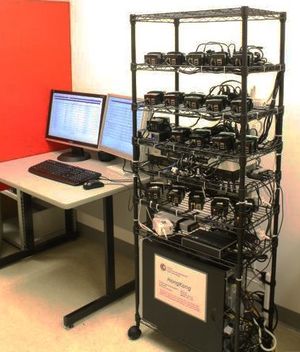Difference between revisions of "Fedora ARM Koji Buildsystem"
Chris Tyler (talk | contribs) |
|||
| (10 intermediate revisions by 3 users not shown) | |||
| Line 1: | Line 1: | ||
| + | [[Category:Fedora ARM Secondary Architecture]] | ||
CDOT is currently running a Koji build system as part of the [[Fedora ARM Secondary Architecture]] initiative. | CDOT is currently running a Koji build system as part of the [[Fedora ARM Secondary Architecture]] initiative. | ||
| Line 4: | Line 5: | ||
== Hardware == | == Hardware == | ||
| − | [[File:Fedora-arm-shelves%2Blcd.jpeg|right|thumb]] | + | [[File:Fedora-arm-shelves%2Blcd.jpeg|right|thumb|The old build system from October 2010.]] |
| − | System hardware consists of | + | System hardware consists of 2 x86_64 PCs (''Japan'' + ''Iraq'') and 4 Calxeda ECX-1000 cards (12 nodes total). Hardware details are listed on the [[Fedora_ARM_Secondary_Architecture/ARM_hardware|ARM hardware]] page. |
== Software == | == Software == | ||
| Line 12: | Line 13: | ||
This system uses the [[:fedora:Koji|Koji]] build software, which is a client-server hub-builder system. Jobs are queued by client systems (whether manually, by package maintainers, or automatically, by a script) to the hub; the builders pick up jobs from the hub and execute them, building software packages and performing related maintenance (such as repository updates). Package builds are performed with [[:fedora:Projects/Mock|Mock]] using an isolated, chroot build environment created specifically for the package being built. | This system uses the [[:fedora:Koji|Koji]] build software, which is a client-server hub-builder system. Jobs are queued by client systems (whether manually, by package maintainers, or automatically, by a script) to the hub; the builders pick up jobs from the hub and execute them, building software packages and performing related maintenance (such as repository updates). Package builds are performed with [[:fedora:Projects/Mock|Mock]] using an isolated, chroot build environment created specifically for the package being built. | ||
| − | + | = Access = | |
This Koji system uses Fedora [https://admin.fedoraproject.org/accounts/ FAS2] certificates, so any person with access to the Fedora [http://koji.fedoraproject.org primary architecture Koji system] has access to the [http://arm.koji.fedoraproject.org Fedora-ARM Koji system] as well. | This Koji system uses Fedora [https://admin.fedoraproject.org/accounts/ FAS2] certificates, so any person with access to the Fedora [http://koji.fedoraproject.org primary architecture Koji system] has access to the [http://arm.koji.fedoraproject.org Fedora-ARM Koji system] as well. | ||
| Line 18: | Line 19: | ||
A web interface is provided for viewing the system status, accessing built packages, and controlling tasks at http://arm.koji.fedoraproject.org | A web interface is provided for viewing the system status, accessing built packages, and controlling tasks at http://arm.koji.fedoraproject.org | ||
| − | + | = Questions? = | |
| − | Please contact [[User: | + | Please contact [[User:Chris Tyler|Chris Tyler]], or use the category link below to explore. |
Latest revision as of 16:53, 23 January 2014
CDOT is currently running a Koji build system as part of the Fedora ARM Secondary Architecture initiative.
Contents
Design
Hardware
System hardware consists of 2 x86_64 PCs (Japan + Iraq) and 4 Calxeda ECX-1000 cards (12 nodes total). Hardware details are listed on the ARM hardware page.
Software
This system uses the Koji build software, which is a client-server hub-builder system. Jobs are queued by client systems (whether manually, by package maintainers, or automatically, by a script) to the hub; the builders pick up jobs from the hub and execute them, building software packages and performing related maintenance (such as repository updates). Package builds are performed with Mock using an isolated, chroot build environment created specifically for the package being built.
Access
This Koji system uses Fedora FAS2 certificates, so any person with access to the Fedora primary architecture Koji system has access to the Fedora-ARM Koji system as well.
A web interface is provided for viewing the system status, accessing built packages, and controlling tasks at http://arm.koji.fedoraproject.org
Questions?
Please contact Chris Tyler, or use the category link below to explore.
